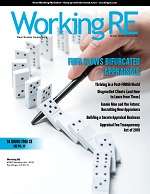 |
“One of the best courses that I have had in 17 years!” -Amy H |
>> Editor’s Note: To help you stay up-to-date and connected, OREP/Working RE has established a Coronavirus (COVID-19) Discussion and Resource Page where you can share your thoughts, experiences, advice and challenges with fellow appraisers. Share information here!
>> Coronavirus Survey: State of the Appraisal Industry
Risky Business: Why Lenders Continue to
Demand Interior Inspections
By Isaac Peck, Editor
On March 23, Fannie Mae and Freddie Mac issued guidance that allows for desktop and exterior-only appraisals in a variety of circumstances when a traditional “interior inspection” is not feasible because of COVID-19 concerns.
The Department of Veteran Affairs (VA), the Department of Housing and Urban Development (HUD/FHA), and the U.S. Department of Agriculture (USDA) all followed suit on March 27, issuing guidelines with their own set of standards and requirements for appraisers which also allow desktops.
With such broad guidelines that allow for alternatives to interior inspections, appraisers across the country are asking: Why are lenders still demanding interior inspections on the majority of appraisal assignments despite the risk involved to appraisers, their families and the occupants?
The answer is cash-out refinances.
Tapping Home Equity
While cash-out refinances represented just a small fraction of the mortgage market as recently as a few years ago, Freddie Mac’s Quarterly Refinance Report (March 13, 2020), indicates that “cash-out” borrowers- those who increase their loan balance by at least five percent, represented 83 percent of all conventional refinance loans. Freddie writes that this is the “the highest share since the third quarter of 2007.”
In other words in the current climate, cash-out refinances are booming. And despite broad flexibilities for purchases and no-cash-out refinances, both Fannie Mae and Freddie Mac require a traditional interior-inspection appraisal for cash-out refinances.
This data confirms what many appraisers are saying via the OREP/WRE Coronavirus Blog and Survey. When Fannie and Freddie announced the new flexibilities when using exterior-only and desktop products, there was a feeling of relief among appraisers and other industry stakeholders, as it seemed like they would be used on the majority of loans during the pandemic to minimize health and safety risks. However, with so many cash-out refinances, appraisers are not getting much relief.
John Smith (not his real name), a Chief Appraiser at a regional AMC, says that there is a boom of cash-out refinances right now. “You might disagree with it but cash-out refinancing is an American tradition. The market needs cash out refis. People are trying to pull equity out of their homes to get through this really tough time,” says Smith.
The result, reports Smith, is very little relief on interior inspections for refinance transactions. “When Fannie and Freddie came out with their announcement last month, we had a lender who had 600 refinance transactions in their pipeline. Out of those 600 transactions, we determined that 463 still needed interior inspections. Most people who are refinancing are trying to get cash out, that’s why they’re refinancing,” says Smith.
(story continues)
In terms of why Fannie and Freddie are not allowing exterior-only and desktop products on cash-out refinances, Smith says that it comes down to risk. “A lot of the purchase transactions are eligible for an exterior-only or desktop product. With purchase transactions, you’ve got a Realtor who did a competitive analysis, a buyer looking at other homes and selecting the subject, negotiating the price, etc. You’ve also got market exposure and the principle of competition. So I think the GSEs are thinking that they’re taking less risk with purchase transactions than with cash-out refinances. Not that the purchase price always equals market value, but on a refinance it can be a complete crapshoot,” says Smith.
Lenders and AMCs are echoing appraiser concerns, according to Smith, and clamoring for relief on interior inspections for cash-out refis. “One way to mitigate the GSEs concerns would be to cap the LTV on cash-out refis; up to that cap, they could allow full appraisal flexibilities,” says Smith.
However, Freddie Mac’s latest guidelines indicate that an automated collateral evaluation (ACE) appraisal waiver can be offered on cash-out refinances of primary residences where the LTV is 70 percent or less, but that LTV amount clearly isn’t satisfying many borrowers.
Smith salutes the appraisers his AMC works with, recognizing that appraisers are some of the bravest people he knows. “Many of the appraisers on our panel are taking this very seriously. Some of them have hazmat type suits, full headgear, gloves, and a few even have shields. Appraisers are unbelievably brave,” says Smith.
Stay safe out there!
OREP E&O: Quote/bind online in minutes- Members enjoy FREE CE.
Click here to read the full release: Valuation Practices during COVID-19
Click here to read: Modified Set of Instructions, Scope of Work, Statement of Assumptions and Limiting Conditions and Certifications for Desktop Appraisals
>> Join the Discussion at OREP/Working RE’s Coronavirus (COVID-19) Discussion and Resource Page where you can share your thoughts, experiences, advice and challenges with fellow appraisers. See what Appraisers are saying here!
>> “Coronavirus State of the Appraisal Industry” Survey. How’s it going?
About the Author
Isaac Peck is the Editor of Working RE magazine and the Vice President of Marketing and Operations at OREP.org, a leading provider of E&O insurance for appraisers, inspectors and other real estate professionals in 50 states. He received his master’s degree in accounting at San Diego State University. He can be contacted at isaac@orep.org or (888) 347-5273.
CE Online – 7 Hours (AQB Approved)
Identifying and Correcting Persistent Appraisal Failures
Richard Hagar, SRA, is an educator, author and owner of a busy appraisal office in the state of Washington. Hagar now offers his legendary adjustments course for CE credit in over 40 states through OREPEducation.org. The new 7-hour online CE course Identifying and Correcting Persistent Appraisal Failures shows appraisers how to avoid CU’s red flags, minimize callbacks, save time, and earn more! Learn how to improve the quality of your reports and build defensible reports! OREP insureds save on this approved coursework. Sign up today at www.OREPEducation.org.
Sign Up Now! $119 (7 Hrs)
OREP Insured’s Price: $99
>Opt-In to Working RE Newsletters
>Shop Appraiser Insurance
>Shop Real Estate Agent
Insurance
Send your story submission/idea to the Editor:
isaac@orep.org



